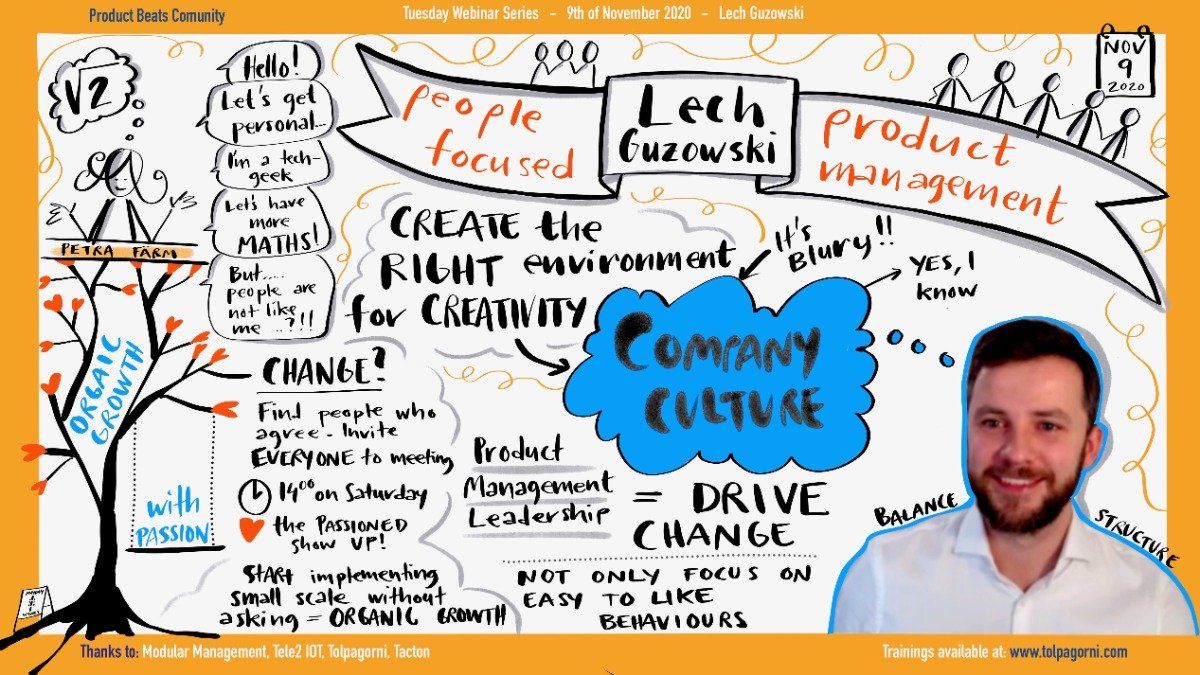Episode 33: Product Culture w/Lech Guzowski
10 November, 2020 / Host: PETRA FÄRM
How Company Culture Impacts Innovation
Product innovation is a crucial aspect of any company's growth and success. It requires a constant stream of creative and unique ideas that are not only user-focused but also team-focused. One critical factor in achieving this is the company's culture, which plays a vital role in determining the success of product innovation, it sets the tone for how teams collaborate and approach problem-solving. To continuously build successful products, it's essential to foster a culture that encourages creativity, structures the innovation process, and promotes leadership.
As product managers, we need to be leaders and build empathy by understanding what others need from us to be successful at their jobs. We should listen to our stakeholders, customers, and colleagues and share our knowledge and insights to help people grow and learn.
The importance of humane and just leadership can be seen in the following quote from the "Art of War": "If the Leaders can be humane and just, sharing both the gains and the trouble of the people, then the troops will be loyal and naturally identify with the interests of the leadership." By demonstrating empathy and fairness in our leadership, we can build a culture that fosters loyalty and encourages everyone to identify with the company's mission and goals. In this article, we will dive deeper into what company culture is, why it is essential, and how it impacts product innovation.
Defining Company Culture
Company culture is the shared values, beliefs, attitudes, and behaviors that characterize an organization. It is the way things are done in a company, and it is what makes one company different from another. It defines the company's identity, shapes its reputation, and influences how people behave and work within the organization.
Why Is Company Culture Important?
Company culture is crucial because it determines how employees interact with each other, how they behave, and how they work towards the company's goals. It also affects how employees view their jobs and how committed they are to the company's mission. In the context of product innovation, the company culture can significantly impact the quality of ideas, the level of creativity, and the speed of execution.
The Impact of Company Culture on Product Innovation
Innovation is not just about having brilliant ideas. It requires a conducive environment that fosters creativity, experimentation, and collaboration. A company's culture plays a vital role in creating this environment. Let's take a look at some of the behaviors that are critical for an innovation-friendly culture and their counterbalances.
Tolerance for Failure vs. Intolerance of Mediocrity
Tolerance for failure is essential for innovation. It means that employees are allowed to take risks, try new things, and make mistakes without fear of punishment or retribution. However, this does not mean that the company should tolerate mediocre performance. The counterbalance to tolerance for failure is an intolerance of mediocrity.
Companies that promote a culture of competence set high standards of performance and recruit the best talent. They ensure that employees have the knowledge, skillset, and experience needed to perform their job. In situations where employees don't perform, they are moved on to roles that better suit their skillset. Senior leaders need to define the difference between productive and unproductive failure and communicate it regularly throughout the organization.
Psychological Safety vs. Radical Honesty
Psychological safety is the belief that one can speak their mind without fear of negative consequences. In an innovation-friendly culture, employees should feel comfortable sharing their thoughts, ideas, and feedback. The counterbalance to psychological safety is radical honesty.
Radical honesty means being honest and upfront with one's thoughts, even if they are not easy to hear. Leaders need to create an environment where people feel safe to speak their minds, challenge ideas, and give constructive feedback. It's important to note that there's a difference between radical honesty and being mean. Leaders need to encourage constructive criticism and avoid personal attacks.
Collaborative Approach vs. Individually Accountable
Collaboration is critical for innovation. It allows for diverse perspectives, knowledge, and skills to come together to create better ideas. However, collaboration does not always mean consensus. In a rapidly changing and complex environment, seeking consensus can hinder the decision-making process. The counterbalance to a collaborative approach is individual accountability.
Individual accountability means that everyone takes responsibility for their decisions and owns the consequences. It creates a culture of trust, where people are not afraid to make decisions, take risks, and be held accountable for their actions. This accountability culture allows for rapid decision-making and avoids the blame game.
Takeaways
- Company culture plays a crucial role in product innovation, as it directly impacts the creativity, engagement, and discretionary efforts of the team working on the product.
- To create an effective innovation culture, companies need to focus on both easy-to-like behaviors, such as tolerance for failure and psychological safety, and tougher behaviors, such as intolerance of failure and radical honesty.
- Creating a culture of competence, accountability, and clear communication is key to fostering innovation and empowering individuals to make decisions and own the consequences.
Speaking of creating a culture of competence and accountability in product management, it's important to note that developing these skills and knowledge requires continuous learning and improvement. And what better way to do that than by enrolling in a comprehensive and reputable Product Management Certification Program? The Productbeats team has recently launched such a program, aimed at providing product managers with the tools, frameworks, and best practices necessary to excel in their roles and drive product innovation. Let's take a closer look at The Productbeats Product Management Certification Program and its offerings.
You might also enjoy watching...
Copyright © 2026 ProductBeats AB

Get The Program Brochure
Submit the form below to have The Program Brochure delivered to your inbox
The title of the notification
The descriptive text of the notification


